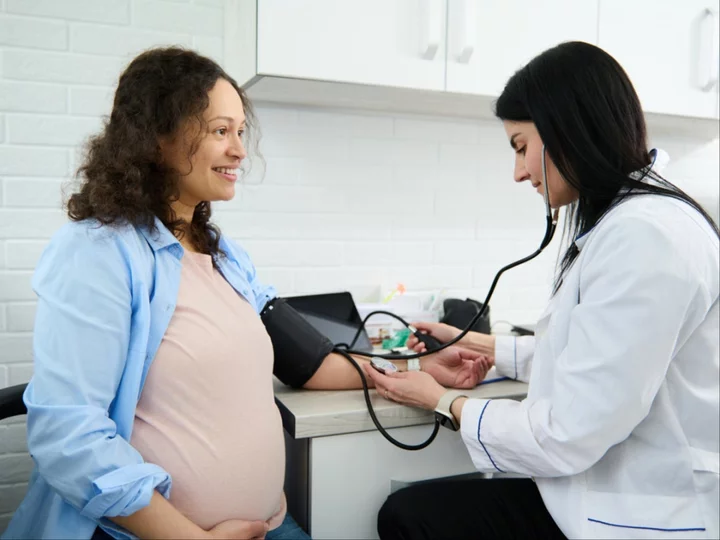Eclampsia is a rare complication of pre-eclampsia and can cause fits, seizures and strokes.
The condition eclampsia describes the type of convulsion or fit – an involuntary contraction of the muscles – pregnant women can experience from week 20 of the pregnancy or immediately after the birth.
What are the symptoms/ warning signs?
Pre-eclampsia is a condition that affects some pregnant women, usually during the second half of the pregnancy (from 20 weeks) or soon after the baby is delivered.
Early signs of pre-eclampsia include having high blood pressure (hypertension) and protein in your urine, according to the NHS. It’s difficult to notice the signs, but they can be picked up during routine antenatal appointments.
Further symptoms of pre-eclampsia include a severe headache, vision problems, such as blurring or flashing, pain below the ribs, vomiting and sudden swelling of the face, hands or feet.
How common are pre-eclampsia and eclampsia?
Most cases of pre-eclampsia do not lead to serious problems or complications, but there is a risk that the mother will develop fits and seizures, called eclampsia, which can be life-threatening for the mother and baby. However, this is rare. According to the NHS, the earlier pre-eclampsia is diagnosed and monitored, the better the outlook for the mother and baby.
Most women make a full recovery after having a fit, but they can put the mother and baby’s health at risk. According to the pregnancy charity Tommy’s. eclampsia is quite rare in the UK, with an estimated one case for every 4,000 pregnancies.
What are the causes of pre-eclampsia?
Though the exact cause of pre-eclampsia is not known, its thought to occur when there is a problem with the placenta – the organ that links the baby and mother’s blood supply.
Who is affected by pre-eclampsia?
A number of health conditions can increase your chances of developing pre-eclampsia, including having diabetes, high blood pressure or kidney disease before pregnancy.
Having an autoimmune condition, such as lupus or antiphospholipid syndrome, or having high blood pressure or BMI, can also increase your chances of pre-eclampsia.
A family history of the condition, being older than 40, or having more than 10 years since your last pregnancy can also increase your chances of pre-eclampsia. Expecting multiple babies, like twins or triplets, may also put a patient at risk.
What are the treatments for pre-eclampsia?
After being diagnosed with pre-eclampsia, a patient will be monitored closely by a specialist to see how severe the condition is.
According to NHS guidance, the only way to cure pre-eclampsia is to deliver the baby, hence why monitoring the mother and baby is crucial until the child is delivered. Patients are often offered medicine to lower their blood pressure until the baby is born.
Read MoreTori Bowie: Pregnant US Olympic sprinter’s cause of death revealed
Vegan family writes letter to neighbours requesting they close their windows when cooking meat
Kelis addresses Bill Murray dating rumours for the first time
How to take care of your mental health at festivals
How to stop hay fever fast? Only one thing worked for me
Jamie Foxx’s rep addresses conspiracy Covid vaccine left actor ‘paralyzed and blind’

